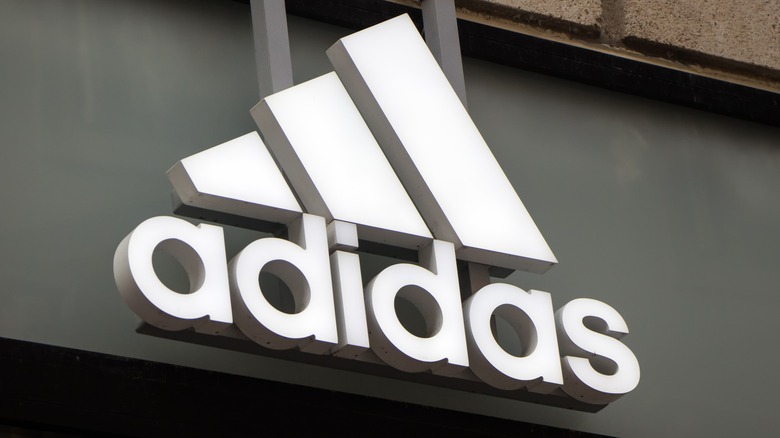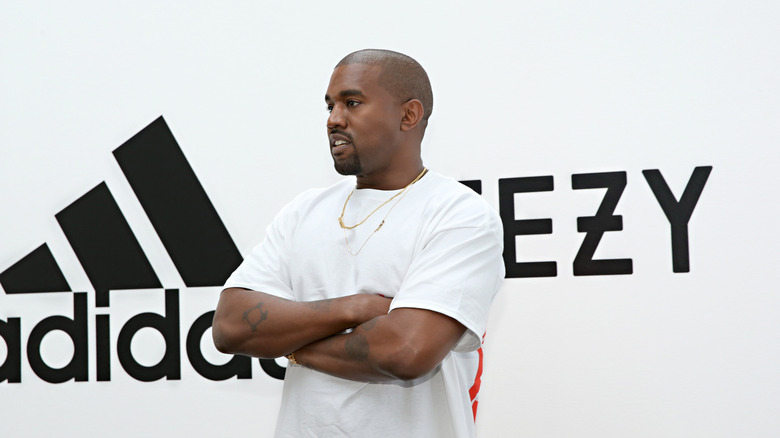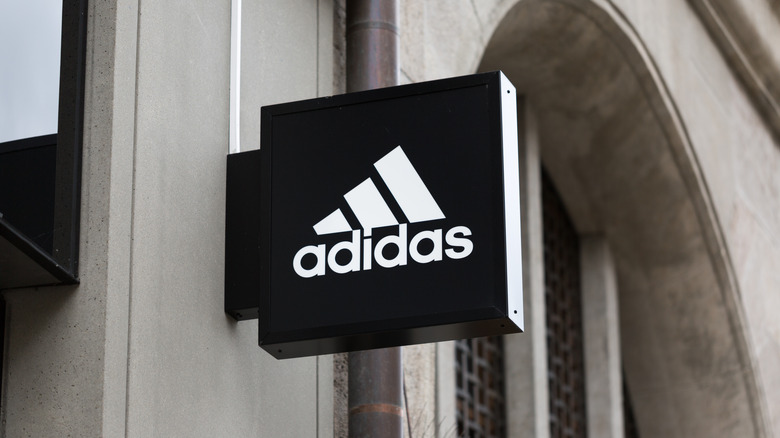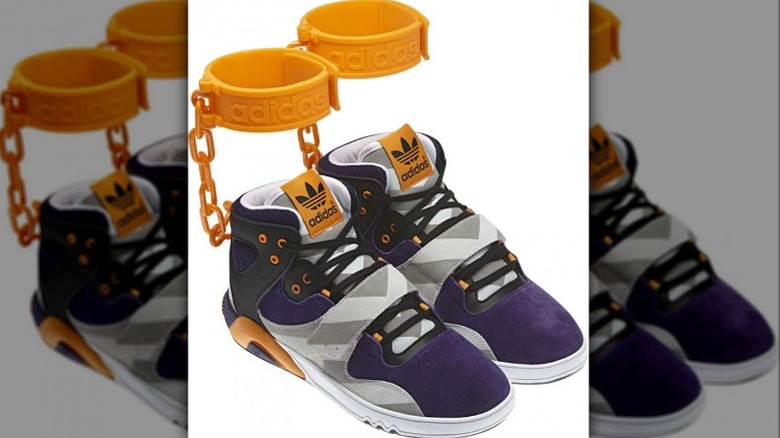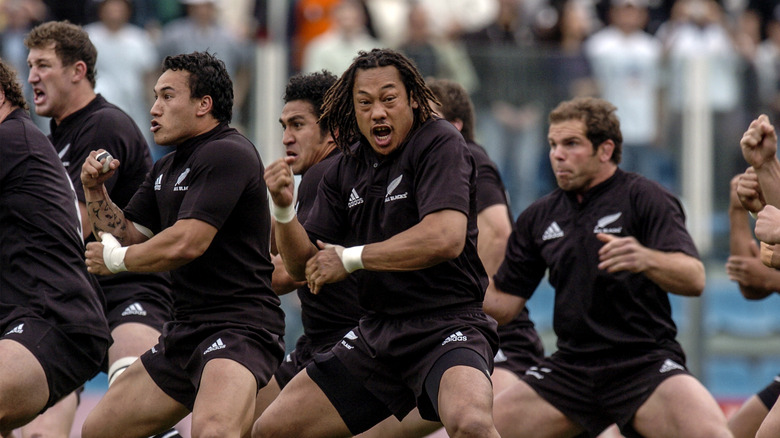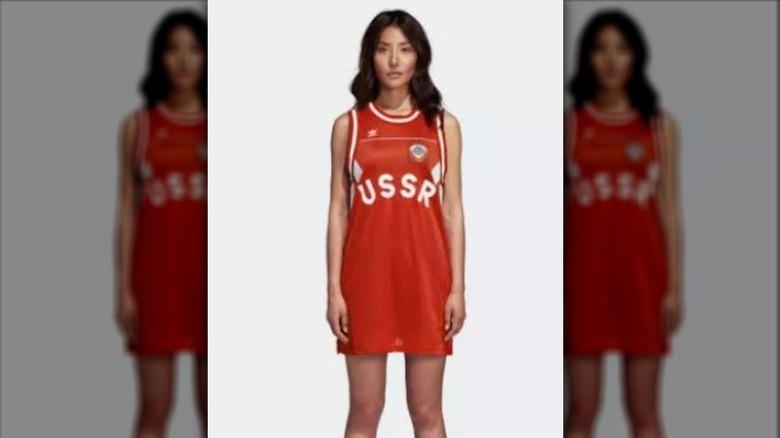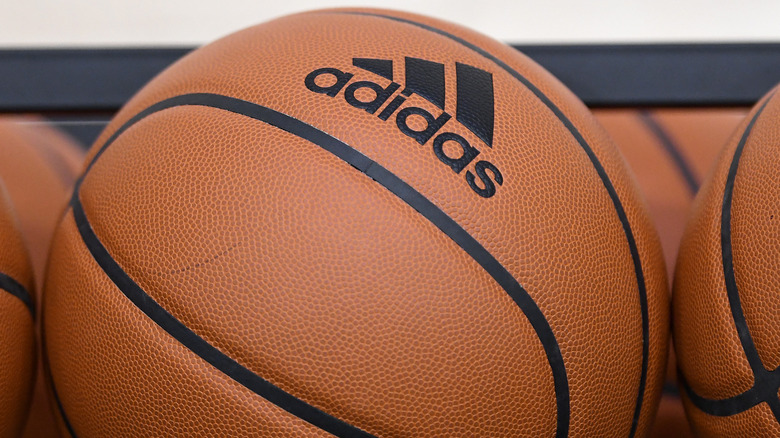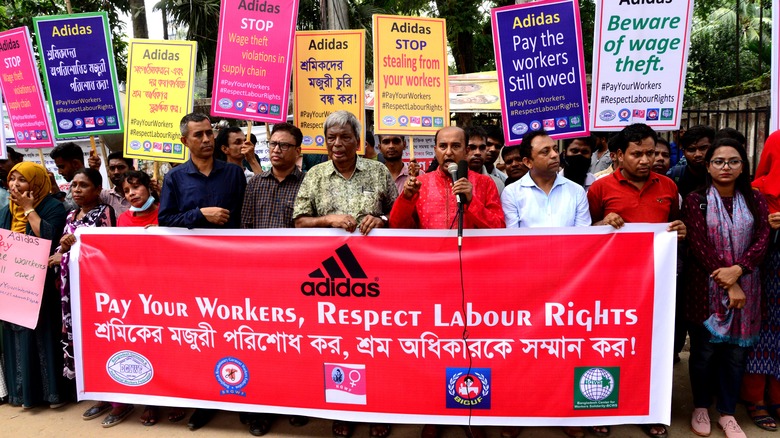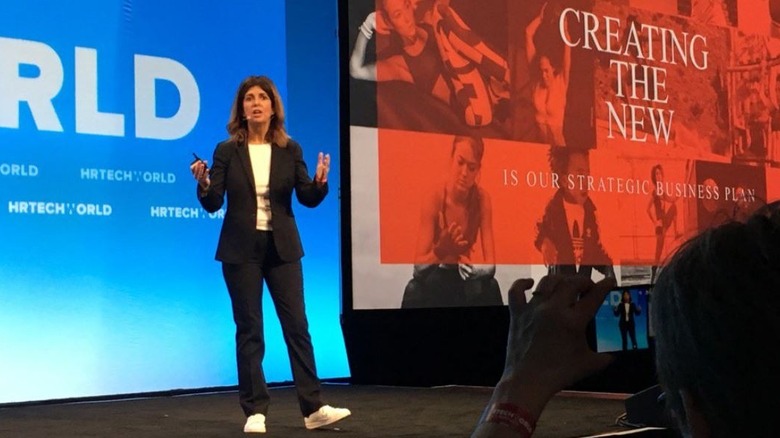Big Controversies That Rocked Adidas
In a way, Adidas was founded because of a controversy (per Encyclopedia Britannica). Named after founder Adolf "Adi" Dassler, Adidas has been making its name in the field of athletic shoe manufacturing — and, later, other sportswear and equipment — since 1949 (per the official Adidas website). However, the Dassler family's history with Olympic-level shoemaking started well before that. This was simply the year brothers Adolf and Rudolf parted ways.
According to The Guardian, there are many stories about how the relationship between the two fell apart, from affairs to strange stories about misunderstandings in a bomb shelter. Regardless of the true reason, Adolf went on to found Adidas, while Rudolf set up Puma ... and the population of their home town of Herzogenaurach picked their sides in the animosity that would last for decades to come. Some allege that the brothers eventually made up, but even if that's true, they remained prisoners of their story. After all, their rift was such a crucial part of both companies' stories that any potentially mended fences had to be classified top secret.
After an origin story as peculiar as this, one might think that Adidas took care of its controversies pretty early on, leaving it free to grow into the sportswear juggernaut the world now knows. However, in reality, the company has gone on to have numerous controversies over the years.
Adidas severed ties with Kanye West over hate speech
Rapper and entrepreneur Kanye "Ye" West's long-standing partnership with Adidas started in 2013, per CNBC. Their Yeezy collaboration, which began in 2016, was a lucrative one — but sometimes profits aren't enough. On October 7, 2022, CNBC reported that Adidas had put the relationship up for review. The reason behind this decision was that West had made multiple critical and mocking social media posts about Adidas and its high-ranking executives, implying idea theft and lack of control as the sources of his anger.
The news about the strained relationship between West and Adidas dropped after the company had attempted to work things out behind the scenes. The world will never know if the parties could have reached a peaceful solution despite these difficulties, because things soon got a lot worse. As Reuters reports, West started to make numerous antisemitic statements, which was simply too much for Adidas. On October 25, the company announced that it had severed ties with West. "Adidas does not tolerate antisemitism and any other sort of hate speech," the company explained.
Adidas courted controversy with a 2022 ad campaign
In 2022, Adidas was set to release a new sports bra line, which naturally called for an ad campaign (per CNN Business). Among a line of more conventional ads, the #SupportIsEverything campaign included a Twitter image that displayed 25 pairs of bare breasts. "We believe women's breasts in all shapes and sizes deserve support and comfort. Which is why our new sports bra range contains 43 styles, so everyone can find the right fit for them," the accompanying text read.
If the intention of the ad was to court controversy, it certainly succeeded beyond measure. Though some liked the ad, many thought that it was simply pointless, needlessly objectifying, and inappropriate. According to CNN, this ad — which also appeared in some promotional print materials — drew several complaints in the U.K., to the point that the country ended up banning it altogether.
Adidas tried to introduce a shackle shoe
In 2012, Adidas tried to introduce a shoe that was a far cry from its usual streamlined, sporty footwear (via CNN). The JS Roundhouse Mids were dramatic-looking street sneakers that boasted a very specific design detail: They were attached to a yellow rubber shackle that was used to "secure" the user's foot to the leg with a chain. "Got a sneaker game so hot you lock your kicks to your ankles?" a Facebook announcement of the product read.
However, the Jeremy Scott-designed shoes had one significant problem. Not entirely unsurprisingly (except, it seems, for Adidas), a shackle-themed shoe didn't exactly go over well in a country that has a dark and well-documented history of slavery. The outcry over the shoe's design was considerable, with many people — including civil rights activist Reverend Jesse Jackson – pointing out that the shoe reminded them of slavery.
Adidas stated that the JS Roundhouse Mid was all about fashion and absolutely not about slavery. However, recognizing that the shoe was a lost cause, the company issued an apology and canceled the product.
New Zealand wasn't happy about Adidas' rugby jersey pricing
New Zealand's national rugby team, the All Blacks, ranks among the greatest sports teams of all time, so naturally, they're pretty popular in the country. According to The New Zealand Herald, Adidas seems to have been well aware of this fact in 2011, when the company priced its All Blacks jersey at 220 New Zealand dollars (the equivalent of $189.87 at the time). Steep as this may be, the real problem arose when local outlets and cost-conscious New Zealanders noticed that you could get the same shirt online for as cheap as $79.95.
Adidas New Zealand initially argued that the pricing was out of their hands and in line with the market. However, per The Sydney Morning Herald, the backlash kept on growing, especially after it transpired that Adidas had ordered some of those cheap online stores to stop shipping the shirt to New Zealand. With people from every walk of life — including high-ranking politicians — joining the growing group of critics, Adidas eventually had no choice but to revoke its orders to the two online stores and issue a heartfelt apology.
The company still refused to bring the jersey's price down, though.
USSR-themed Adidas products caused an outcry
In 2018, Adidas was gearing for the upcoming soccer World Cup tournament in Russia with a truly retro product, per the Baltic News Network. The company had introduced soccer jerseys that boasted the Soviet Union's old acronym, USSR. According to The Moscow Times, there was also other USSR-branded apparel available.
However, the thing about fun callbacks is that they're not necessarily all that funny when they refer to a regime that's responsible for some of the worst moments that went horribly wrong in Russian history – including various awful events that Eastern European countries had to go through during their time with the Union of the Soviet Socialist Republic. People of these post-USSR countries certainly failed to see the point of Adidas peddling USSR-branded products, and outrage soon sparked in places such as Lithuania. "Being sick with 'imperial nostalgia' — it still occurs. A bit surprising from the famous @adidas, though," the country's Ministry of Foreign Affairs sardonically posted on Twitter, including an image of the company's USSR-themed sports dress. Multiple people also wondered whether Adidas would introduce kits with Nazi symbols next.
Perhaps unsurprisingly, by the time the scandal hit the news on May 8, the products had already started disappearing from Adidas' online store.
Adidas was caught up in a college basketball corruption scandal
In 2017, the world of college basketball experienced a massive shockwave when prominent coaches and other operators were indicted for corruption and taking bribes, according to NBC News. There was also one major company named in the federal investigation: Adidas, which was a major presence in college basketball.
The corrupt activities revolved around making sure that talented players ended up with certain schools' teams, as well as steering them toward particular representatives — and, of course, a certain brand of apparel. Some people near the very top of the college basketball food chain were involved. Per The United States Attorney's Office, the Adidas representatives involved in the scandal included Director of Global Basketball Sports Marketing James Gatto and Adidas consultant Merl Code. In 2019, Gatto received a nine-month prison sentence for his role in the scandal, while Code was given a six-month sentence, according to ESPN. Understandably, neither of them works with Adidas anymore.
Adidas has a questionable labor rights history
The Adidas Group's website describes the company's commitment to human and labor rights, as detailed in a program set up in 1997. However, several organizations have claimed that the company has continued to add to its history of labor rights issues well beyond that year. According to nonprofit organization Oxfam Australia, Adidas has been known to use sweatshops to manufacture its goods, and the company isn't historically a huge fan of labor rights and unionizing. As an example of Adidas suppliers' less than ideal working conditions, Oxfam has detailed several issues in the workers' rights practices of Adidas' suppliers in Indonesia.
Organizations such as Pay Your Workers and Worker Rights Consortium have also reported unethical business practices in Adidas' supply chain. In 2022, The Guardian reported that cotton from Xinjiang, China, has been found in Adidas products. This is problematic, because cotton from the area has been boycotted by a number of companies after it transpired that the region uses forced labor as cotton pickers.
Adidas' website does note that the company is working on a program that enables them to better keep tabs on potential human rights issues across the board. This system is estimated to be ready in 2025.
Adidas had a racial inequality controversy
In 2020, George Floyd's death during an arrest on May 25 lit a fire under the nation, and the ensuing protests brought social issues and racism to the forefront of a great many discussions. Per Business Insider, Adidas also became embroiled in a racism controversy that year, when the company's employees started calling out their employer's racial inequality. Per CNN Business, 83 Adidas employees from across the world signed a letter that demanded an investigation of the person they felt was a notable part of the problem: the company's head of HR, Karen Parkin.
According to the workers, Parkin hadn't done enough to address the various diversity issues within the company, and some employees alleged that she'd also shrugged off racism issues as "noise" during a meeting. Adidas clearly took the situation seriously, since on June 30, the company's website announced that Parkin was leaving the company.
"While I would very much like to lead this critical transformation effort, after much reflection and listening to the feedback I've received, I have come to accept that I am not the right person to lead that change," Parkin wrote to Adidas employees in her goodbye email.
Adolf Dassler's Nazi past
Per The Guardian, the founders of Adidas and its rival company, Puma, share a very particular blemish in their personal histories: Both Adolf and Rudolf Dassler joined the Nazi party in 1933. This particular part of Adidas' history has recently received attention due to the antisemitic comments of former Adidas collaborator Kanye West. As Time points out, the Dasslers worked with the Nazi party throughout Adolf Hitler's reign, and their company was even retrofitted for munitions manufacture during World War II — though historian Peter Hayes has noted that the Dasslers themselves likely weren't involved with the production.
The Jewish Telegraphic Agency looked a little deeper into the story shortly before Adidas severed ties with West. The Dasslers became quite successful during the Nazi regime before WWII started, thanks to the country's fascination with sports. However, it's worth noting that Adidas also provided shoes for Jesse Owens, the Black Olympic legend who dominated the 1936 Berlin Olympics to the tune of four gold medals. After the war, the Adidas founder was also able to prove that he wasn't a loyal Nazi, despite Allied suspicions.
Even so, Adidas has opted to omit the fact that its founder was once a card-carrying Nazi from its official history, and the company's website largely glazes over Dassler's story until 1949.
